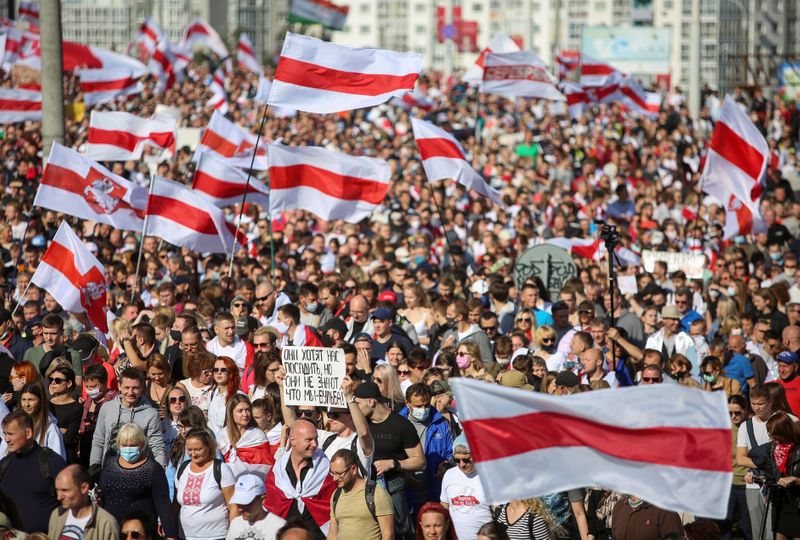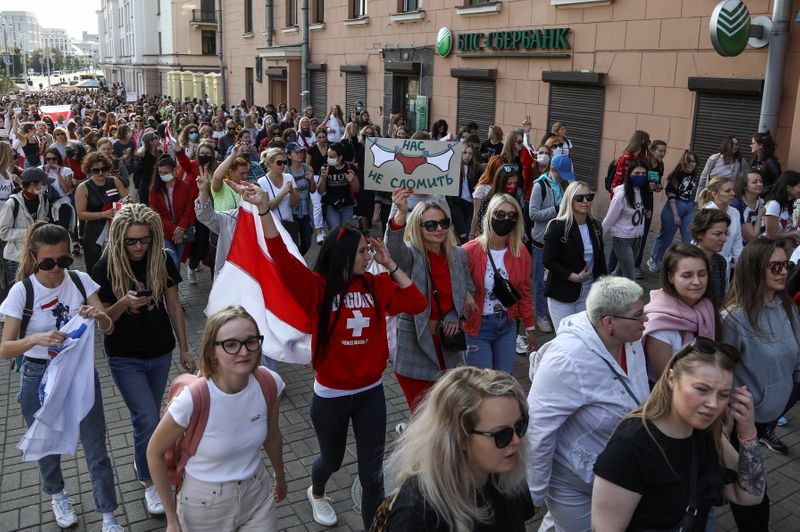By Katya Golubkova and Tom Balmforth
MOSCOW (Reuters) - At least 100,000 Belarusian protesters took to the streets of Minsk on Sunday in one of the biggest demonstrations yet against President Alexander Lukashenko after he claimed a landslide victory in an election his opponents say was rigged.
As public anger continued to build against Lukashenko, who has ruled the former Soviet nation for 26 years, Moscow offered him support by saying it would send paratroopers to Belarus for "Slavic Brotherhood" joint drills.
A wave of protests has swept Belarus since the Aug. 9 presidential election, which demonstrators say was actually won by Sviatlana Tsikhanouskaya. Key opposition figures have since either been jailed or fled the country, with Tsikhanouskaya now in Lithuania.
Lukashenko denies the election was rigged and has said foreign powers are behind the protests.
A vast column protesters marched through the capital Minsk towards a government district on Sunday, chanting "Long live Belarus" and "You're a rat," a taunt that has frequently been used against Lukashenko during demonstrations.
They came to a halt and chanted "fascists" as hundreds of riot police with shields blocked off the road. Meanwhile in the city of Brest, police used water cannons on protesters, according to the Nexta Live channel.
Police said they had detained over 400 people in Minsk alone. A Reuters witness said that detentions were continuing on Sunday evening.
The atmosphere was tense, with a large police presence in parts of the capital, and some central areas sealed off with barbed wire, including Oktyabrskaya Square (NYSE:SQ) and Independence Square - common focus points of anti-government rallies .
The Interfax Russian news agency reported that shots had been fired into the air to warn off protesters in an area of Minsk where the Belarusian leadership lives.
An interior ministry said later one shot was fired in the air.
RUSSIAN PARATROOPERS
The unrest comes as Lukashenko, in power since 1994, prepares to travel to Russia on Monday for talks with President Vladimir Putin.
Moscow, a neighbour and traditional ally, has stepped up support, offering to potentially restructure Belarusian debt, and providing banking liquidity. It has also said Russian riot police could be made available if needed.
On Sunday, Russia's defence ministry said it would send paratroopers from its elite Pskov division to Belarus for the joint drills starting on Monday and running till Sept. 25, the TASS state news agency reported.
On the streets of Minsk, some critics of Lukashenko expressed hope that the sheer size of Sunday's protests would undermine the Belarusian leader and make it difficult for Putin to back him openly.

"We have to show with this march that he (Lukashenko) doesn't control the country, that he is not in a position to speak on behalf of Belarusians," said Gennady, 35, a logistics worker who declined to give his surname.
